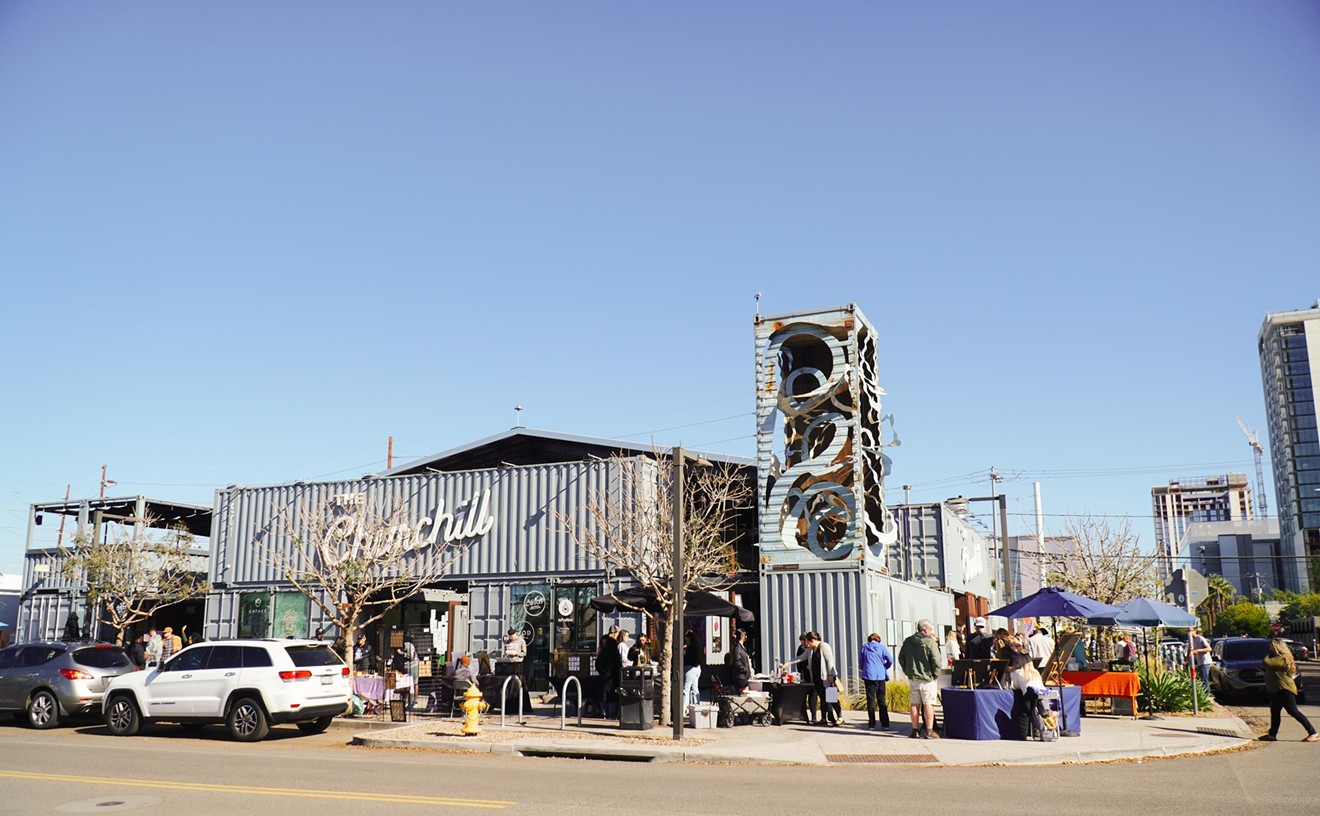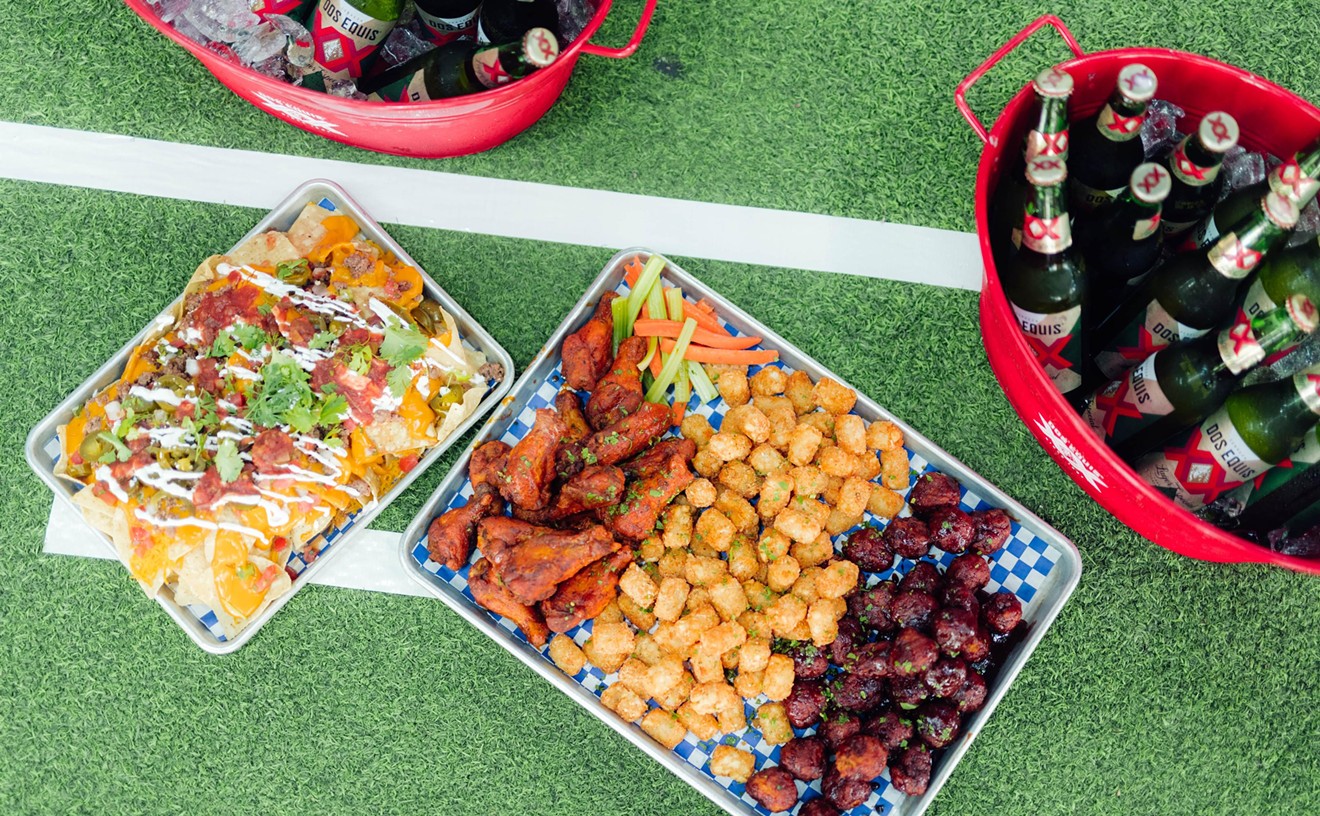It's great to live in a university town. You have access to the wisdom of great minds. The arts flourish. And the presence of thousands of co-eds gives a meaning to existence that Philosophy 101 can't compete with. Vibrant and pulsating, a university setting can keep you from going stale: Even though you grow older, the students never do. They're perpetually full of life, full of hope and short of cash. That's why cheap restaurants tend to thrive in that environment. Tempe certainly has its share of inexpensive, run-of-the-Mill Avenue burger bistros, pizza parlors and sandwich shops. But it has suddenly sprouted some first-rate ethnic joints, serving tasty Third World fare at prices that should relegate the phrase "starving student" to the dustbin of history. Down the street from the Tempe mosque, Shalimar is a new Indian restaurant run by a genial Pakistani Muslim. A Sikh chef mans the kitchen.
It's got none of the grungy, utilitarian student look that often afflicts this kind of establishment. A natty gray, navy and pink color scheme, linen napkins and comfortable, curved-back chairs make a favorable first impression. So do the mirrors etched with floral designs and the homey white curtains. The Muslim-Sikh partnership reverses standard Hindu restaurant operating procedures. At Shalimar, religion proscribes alcohol, but permits beef. Still, I would never order beef at an Indian restaurant, for the same reason I'd avoid the low-cholesterol chicken platter at a steak house: I just can't imagine that the kitchen really has its heart in it. The mixed-appetizer plate provides a quick heap of decent munchies to keep hungry scholars from prematurely expiring. None of the items is likely to win acclaim from the American Heart Association. Samosas are deep-fried turnovers stuffed with mixed vegetables. Chicken, eggplant and cauliflower pakora are all battered and deep-fried. If "deep-fried" goes against your religious beliefs, the mulligatawny soup is a good alternative. This British-inspired broth features lots of lentils and generous chunks of chicken. Shalimar begins to shine when it brings out the main dishes. Mixed tandoor is the best way to sample the beauties of the tandoor, a fiery hot clay oven that cooks food quickly while sealing in the juices. The platter here contains a quarter chicken, moist lamb hunks, boneless chicken breast, two shrimp, marinated ground lamb and a fistful of sizzling onions. At $10.95, it's the most expensive item on the menu, but you won't get shortchanged. Grohan shrimp is a specialty you won't find in too many Indian restaurants. A half-dozen shrimp come simmered in a decadent coconut-cream sauce, heavily laden with nuts and spices. This dish is rich, redolent with lush, exotic flavors. Rogan josh is an Indian staple, tender lamb smoothly cooked in butter and spices. As a test, we asked the kitchen to turn on the heat, and the pepper-packed portion we received indicated that the chef takes customer requests seriously. Good as they were, these entrees didn't prepare me for Shalimar's vegetarian offerings. Vegetarian plates generally conjure up nasty images of bland, sprout-filled fare, groaning with seeds, twigs and berries. But the meatless dishes here could convert the most stubborn carnivore. Our host raved about his chef's virtuosity with saag paneer. "Only two chefs in America can do it," he claimed. (According to him, the other is in Houston.) I'm a believer. The version here is irresistible, freshly chopped spinach cooked in cream with bits of Indian cheese. I don't know what the flavor secret is, but it should be written down and stored in a safe place, so future generations can enjoy it. Bengan bhartha emits the delightful aroma of roasted eggplant, pured with onions and peas, with a spice rack full of seasonings. And matar kofta, vegetarian kebabs made from minced vegetables, swims in a velvety cream sauce, thickened with cashews. Only vegetable biryani failed to meet Shalimar's high standards. No problem with the generous helping, the vegetable medley or the delightful sprinkling of cashews and raisins. But the overcooked basmati rice dried everything out. Shalimar does a bang-up job on breads, one of the glories of Indian cooking. Paratha, multilayered bread made from whole wheat flour, and kulcha, leavened bread stuffed with onions and spices, come hot and steaming, a perfect accompaniment to the main dishes. Sweets are never the highlight of Indian meals. But the astonishingly luscious ras malai may stimulate revisionist thinking on this subject. It's kind of an Indian cottage cheese, soaked in divine, nut-studded cream, fragrant with cardamom. Dessert lovers who can take comfort in John Maynard Keynes' famous observation--In the long run, we're all dead"--will have the easiest time overlooking this treat's nutritional deficiencies. You don't have to own a Phi Beta Kappa key to discern that Shalimar offers a tempting combination of value and taste. Even ASU students should have no trouble figuring it out. Cafe Istanbul, 903 South Rural, Tempe, 731-9499. Hours: Lunch, Monday through Friday, 11 a.m. to 2:30 p.m., Saturday, noon to 2:30 p.m.; Dinner, Monday through Saturday, 5 to 10 p.m.
Cafe Istanbul is another ethnic gem that should make student cafeterias obsolete. Despite the misleading Turkish name, this place features Lebanese fare. But I can understand the reluctance to do business as "Cafe Beirut"; that doesn't have a very festive connotation these days. The restaurant is housed in a small, spare room, tucked inside a shopping strip mall. Jars of pickled vegetables line a window that opens to the kitchen in the back. Miniatures in ornately decorated frames and baskets with dried flowers adorn the walls. Diners at the dozen small tables can tap their feet to nonstop Middle Eastern music. The food is superb, authentic and affordable. And there's plenty to choose from. At many ethnic restaurants, appetizers are a deep-fried, overpriced yawn. Not here. Sanbusek could be called Lebanese blintzes, three thin, crispy cylinders of dough enfolding mint-freshened, soft white cheese. They're exquisite, with a right-out-of-the-kitchen taste. Don't miss the kibbe, either, a highly seasoned (but not spicy hot) meat and bulgur wheat blend, dotted with pine nuts. But make sure you point to the right kibbe starter. There's also a raw version, made from ground lamb loin, that requires a hardy sense of adventure. If your jaded palate no longer finds the traditional dips of hummus and baba ghanouj sufficiently exotic, Cafe Istanbul has several unusual Middle Eastern alternatives. Mjadara is a thick paste made from lentils, rice and onions. Pour on some olive oil, and scoop it up into warm pita. A little of this heavy starter goes a long way. Loubieh bi zeit is a lighter option, a refreshing mix of green beans, onions and tomatoes. Do you know how Charlie Brown must feel whenever he sees Lucy holding a football for him to kick? Maybe, he tells himself, this time she can be trusted. That's what goes through my mind whenever I see shawarma on a menu. When I lived in the Middle East, I used to gorge on this Lebanese delight, with its alternating layers of lamb and beef, gloriously cooked to a moist, crisp turn on a slow-spinning rotisserie. Nothing I've had on this side of the Atlantic has remotely approached the shawarma of days past. So when I saw it offered at Cafe Istanbul, I thought, "Here we go again." I warily asked the waiter if their shawarma was reliable. In response, he marched me back into the kitchen to check for myself. It sure looked like the real thing, I said, inspecting the juicy evidence, while the bewildered kitchen staff nodded in agreement. A few bites removed any lingering doubt. You can get shawarma at lunch as a pita sandwich, or heaped on a plate at dinner. Other standard Middle Eastern fare also exhibits high quality. The Istambuli kebab combo, featuring profit-busting amounts of lamb, chicken and kafta (ground lamb and beef), comes expertly scented and grilled. Grilled chicken, about a quarter of a bird marinated in a bucket of lemon, has a pleasing zing, especially if you mistake the mound of garlic paste for a scoop of mashed potatoes. And ma'anek, a vividly flavored Lebanese lamb sausage, makes a wonderful midday sandwich. A few minor cavils. Falafel is fresh and crisp, without the shriveled, dried-out taste that occasionally strikes this chickpea-based staple. But it's fried in strong-scented corn oil, not exactly a typical Levantine touch. The rice accompanying the platters is pretty dull stuff. And there should be more of the excellent Turkish coffee for the $1.25 tag. How about setting down one of those long-handled, brass, Middle Eastern coffee pourers, filled with steaming, sludgy additional brew? Cafe Istanbul provides a taste of Lebanon, without the car bombs, religious strife or political intrigue. Students of Middle Eastern gastronomy should find themselves right at home.










